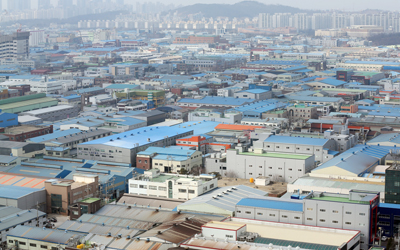On the back of increased semiconductor, machiner output
South Korea's industrial output rose for the second straight month in December from a year earlier on the back of increased production of semiconductors and machinery, government data showed Wednesday.
Production in the mining, manufacturing, gas and electricity industries rose 4.3 percent in the last month of 2016 from a year ago, continuing its upward march from a 5.3 percent rise in November, according to the data by Statistics Korea.
From a month earlier, however, the figure edged down 0.5 percent due to a drop in electronics parts and processed metals.
Production in the service sector added 1.7 percent in December from a year earlier, with a 0.3 percent on-month rise.
For all industries, output increased 3.3 percent on-year in December but remained flat from a month earlier, the data showed. (Yonhap)
N. Korea likely to give Trump early test of relations with China: U.S. lawmaker
North Korea is expected to provide U.S. President Donald Trump with an early test of relations with China, a U.S. House lawmaker was quoted as saying Tuesday.
"The next step is going to be forced on the president because the next step will be a provocative act by North Korea that will force the president to confront China on its North Korea policy," said Rep. Adam Schiff (D-CA), the top Democrat on the House Intelligence Committee, at a breakfast hosted by the Wall Street Journal.
"I think that will happen before we have any intensive trade discussions," he said, according to the paper.
Schiff also expressed concern that the North could perfect the capability to miniaturize a nuclear warhead and mount it on an intercontinental ballistic missile in the next few years while Trump is in office.
"The key here is China, and where we do see China cracking down?" he was quoted as saying. "We see it has a big impact on North Korea and periodically they are willing to crack down."
China would be willing to put more pressure on the North if the "costs of inaction on their part are too high," the lawmaker said, according to the report.
North Korean leader Kim Jong-un said in his New Year's Day address that the country has entered the final stage of preparations to test-fire an intercontinental ballistic missile, an apparent threat that the North is close to developing a nuclear-tipped missile capable of striking the continental U.S.
In response, U.S. President Donald Trump vowed to stop the North from mastering such ICBM capabilities, saying that the North's development of a nuclear missile capable of striking the U.S. "won't happen," though he didn't elaborate on how he would stop it.

Trump and aides have not outlined what their North Korea policy will look like. But it will likely center on pressuring China to exercise more of its leverage as the North's main food and energy provider to rein in the provocative regime.
Trump has repeatedly accused Beijing of gaining massive profits through unfair trade and currency practices in what he calls "totally one-sided trade" with the U.S. while refusing to help rein in its communist neighbor.
He has even raised questions why the U.S. should stick to the "one-China" policy of diplomatically recognizing only Beijing, not Taiwan, and spoke by phone with Taiwanese President Tsai Ing-wen, the first time in decades that a U.S. president or president-elect has done so, in a breach of long diplomatic tradition. (Yonhap)

